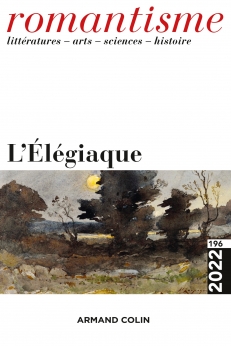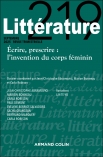
ROMANTISME N°196 (2/2022)
Pour acheter ce numéro, contactez-nous
Recevez les numéros de l'année en cours et accédez à l'intégralité des articles en ligne.
Dans la poésie romantique, la « corde d’airain » du registre polémique n’est pas l’unique instrument qui se dote d’une portée politique. L’élégiaque apparaît lui aussi comme un registre adapté à l’engagement sociopolitique. Les auteurs d’un vaste romantisme social à travers le siècle, de Louis Belmontet à Joseph Déjacque, en passant notamment par Marceline Desbordes-Valmore et Victor Hugo, prennent part à un renouvellement du registre élégiaque en le mettant au service de la dénonciation des injustices et de l’exhortation au progrès. L’étude formelle permet de dégager une double tendance : le poème de déploration crée une communauté élégiaque. En ce sens, il est déjà politique. Par ailleurs, l’élégie se fait illocutoire en bousculant sa temporalité traditionnelle : chez les romantiques engagés, elle est une tension, un élan, d’un présent en deuil vers des lendemains qui chantent.
In Romantic poetry, the “bronze string” as polemical register is not the only instrument to give itself political resonance. Elegy also proves itself to be a register suitable for socio-political commitment. Those authors responsible for the creation of a wide social Romanticism throughout the century, from Louis Belmont and Joseph Déjacque, through amongst others Marceline Desbordes-Valmore and Victor Hugo, participate in the renovation of the elegiac register by having it serve the denunciation of injustice and the exhortation to progress. The paper focuses on a formal study to bring to light two tendencies : the poem that deplores creates an elegiac community. In that sense it is already political. Furthermore, the elegy can gain illocutory force by shuffling its traditional temporality: amongst political Romantics, it represents a tension, a drive, from a present steeped in mourning to glorious tomorrows.

